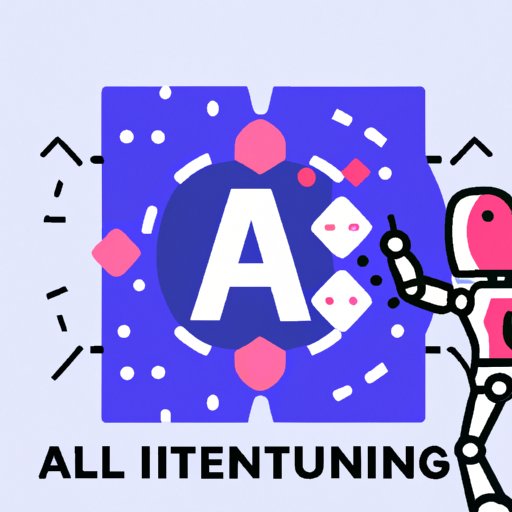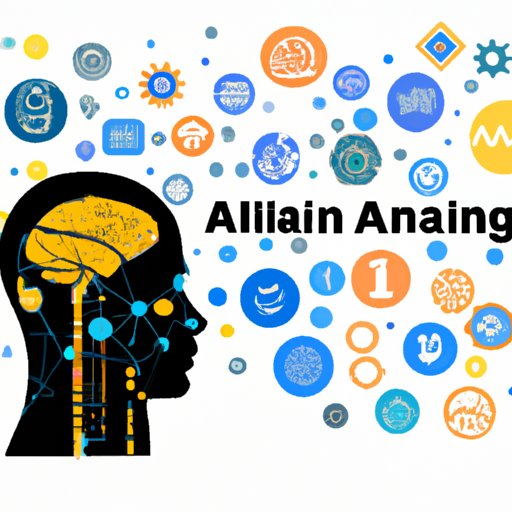Introduction
Artificial intelligence (AI) is a rapidly growing field that has become increasingly important in many aspects of our lives. From self-driving cars to online customer support bots, AI technologies are being used to improve efficiency, automate processes, and enhance user experiences. As a result, there is a growing demand for professionals with AI expertise.
However, many people are intimidated by the concept of learning AI and wonder if it is difficult to learn. In this article, we will explore the pros and cons of learning AI and provide tips for beginners on how to get started. We will also discuss the various challenges associated with learning AI and assess the overall difficulty level of AI education.

A Guide to Learning AI for Beginners
For those who are just starting out in AI, the first step is to identify the right resources. There are numerous books, websites, and online courses that can provide a good foundation for learning AI. Additionally, many universities and colleges offer AI-focused programs, which can be a great way to gain hands-on experience and develop specialized skills.
Once you have identified the right resources, the next step is to set up a learning environment. This should include a computer or laptop with enough processing power to handle AI applications, as well as any necessary software and tools. Additionally, it is important to have access to large datasets for practice and testing purposes.
The third step is to develop an understanding of the basics of AI. This includes topics such as algorithms, data structures, and programming languages. Additionally, it is important to understand the principles of machine learning, which is the process of teaching computers to make decisions based on data. Once you have a good grasp of the fundamentals, you can begin to explore more advanced topics.

Examining the Challenges of Learning AI
One of the biggest challenges of learning AI is analyzing complex algorithms. Algorithms are sets of instructions that tell computers how to solve problems. AI algorithms are often very sophisticated and require a deep understanding of mathematics and computer science to properly analyze and optimize them.
Another challenge is keeping up with rapidly changing technologies. AI is an ever-evolving field, and new breakthroughs are announced on a regular basis. As a result, it is important to stay up-to-date with the latest developments and adjust your skills accordingly.
Finally, it is important to be able to adjust to new applications. AI technologies are being used in a wide range of industries, from healthcare to finance. As such, it is important to be able to quickly adapt to different use cases and understand how to apply AI solutions in various contexts.
Breaking Down the Difficult Concepts in AI
AI technologies rely heavily on large datasets for training and validation purposes. As such, it is important to have a good understanding of data processing techniques, such as cleaning, normalization, and feature engineering. Additionally, it is important to understand the various types of machine learning techniques, such as supervised and unsupervised learning, as well as popular algorithms such as decision trees and random forests.
Finally, another difficult concept in AI is understanding neural networks. Neural networks are complex models that are capable of learning and making predictions based on input data. They are often used for tasks such as image recognition and natural language processing.

Assessing the Difficulty Level of AI Education
In order to assess the difficulty level of AI education, it is important to compare it to other fields. Generally speaking, AI tends to be more challenging than traditional software development due to its reliance on mathematics, statistics, and complex algorithms. However, it is significantly less difficult than fields such as quantum computing or robotics.
It is also important to consider the time investment required for learning AI. Depending on the complexity of the concepts, it can take anywhere from a few months to several years to become proficient in AI. Additionally, it is important to note that AI is a rapidly evolving field and requires ongoing study and practice in order to stay ahead of the curve.
Finally, there are specialized AI training programs available that can help students quickly master the fundamentals of AI. These programs are often more expensive than traditional university courses, but they can provide a more focused and efficient approach to learning AI.
Conclusion
Learning AI can be a daunting task for beginners, but with the right resources and dedication, anyone can become proficient in AI. While there are some challenges associated with learning AI, such as analyzing complex algorithms and adjusting to new applications, these challenges can be overcome with practice and perseverance. Additionally, specialized AI training programs can provide an effective and efficient way to quickly master the fundamentals of AI.
In conclusion, while AI is a complex field, it is not insurmountable. With the right resources, dedication, and guidance, anyone can become proficient in AI.
(Note: Is this article not meeting your expectations? Do you have knowledge or insights to share? Unlock new opportunities and expand your reach by joining our authors team. Click Registration to join us and share your expertise with our readers.)
